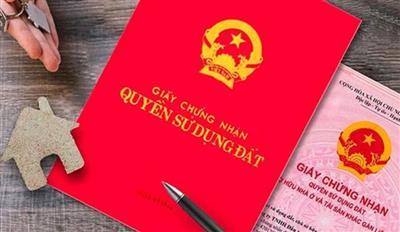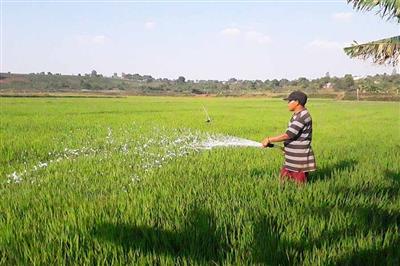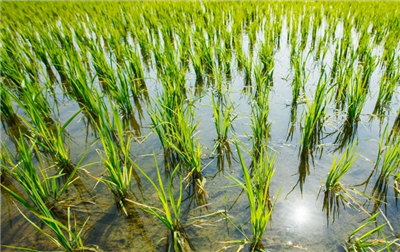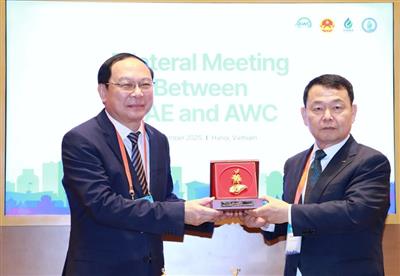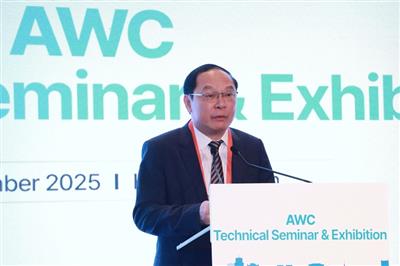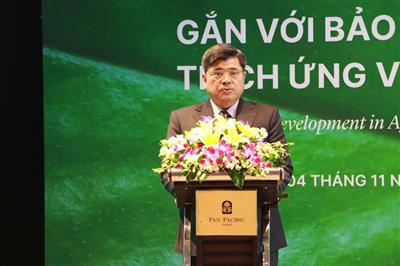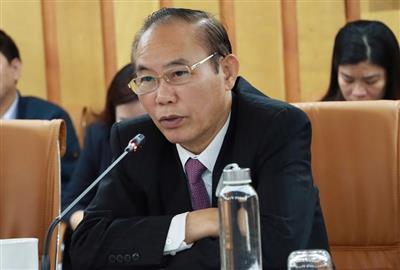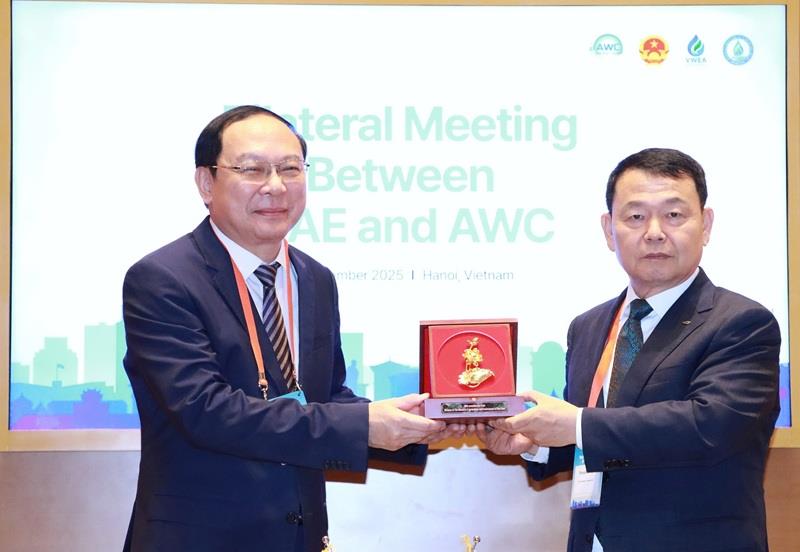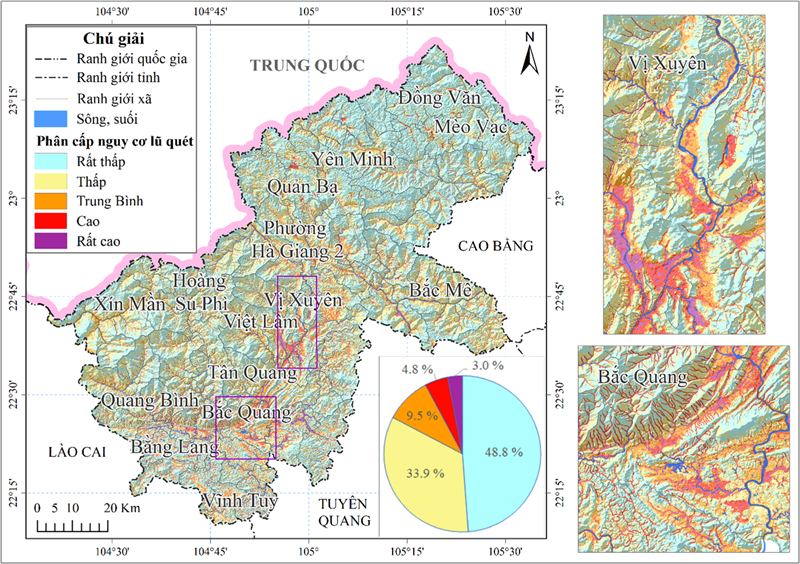
Natural Resource and Environment Magazine celebrates its 21st anniversary with a return-to-roots event and symposium
21/10/2024TN&MTOn October 11, 2024, at the Huynh Thuc Khang Press School in Tan Thai commune, Dai Tu district, Thai Nguyen province, Natural Resource and Environment Magazine celebrated its 21st anniversary (October 13, 2003 - October 13, 2024) and held a symposium on the theme: "Enhancing the role of members of the Journalists’ Association in developing the content of the Natural Resource and Environment Magazine."
The event was attended by journalist Phan Huu Minh, former Standing Committee member and former Head of the Inspection Committee of the Vietnam Journalists' Association. On behalf of the magazine, attendees included Dr. Dao Xuan Hung, Editor-in-Chief; Master Kieu Dang Tuyet, Deputy Editor-in-Chief; Master Tran Thi Cam Thuy, Deputy Editor-in-Chief and Secretary of the Journalists' Association of the magazine; as well as the magazine's entire staff and employees.
At the historic Huynh Thuc Khang Press School, a national relic, the magazine organized the 21st-anniversary celebration and symposium on the topic of "Enhancing the role of members of the Journalists’ Association in developing the content of the Natural Resource and Environment Magazine”. During this visit, the editorial board also aimed to provide journalists with first-hand experiences of historical journalism relics located in Thai Nguyen—the birthplace of Vietnam’s revolutionary journalism, where the Vietnam Journalists' Association was founded, and where the first journalism school, named after Huynh Thuc Khang, was established, alongside other notable events in journalism history.
A symbolic location for Vietnam's Revolutionary journalism
In his address, Dr. Dao Xuan Hung, Editor-in-Chief of Natural Resource and Environment Magazine, expressed deep emotion in visiting such a significant site in the history of Vietnam's revolutionary journalism. He emphasized the invaluable opportunity to witness and learn about the legacy of earlier generations of journalists.

Dr. Dao Xuan Hung, Editor-in-Chief of the Natural Resources and Environment Magazine
"This is a meaningful place for our magazine's 21st-anniversary celebration. It allows today's journalists to reflect on the memories of their predecessors, helping us absorb invaluable lessons from past generations. These experiences provide motivation and energy for us to continue building and developing the Resource and Environment Magazine," said Dr. Dao Xuan Hung.
He urged members of the Journalists' Association to continue honing their skills, taking responsibility for effectively communicating policies related to the resource and environment sector accurately and scientifically, ensuring effective communication of the Ministry of Natural Resources and Environment’s political objectives.
During the celebration, Dr. Dao Xuan Hung expressed his gratitude to former leaders, staff, and retirees of the magazine who have contributed significantly to its growth. He emphasized that further development of the magazine would require the collective efforts, unity, and shared vision of all staff members. "Only through unity can we achieve the ambitious goals we have set for the future development of the magazine," he said.

The Natural Resources and Environment Magazine offers flowers at the Huynh Thuc Khang Press School national historic site
Journalist Phan Huu Minh, representing the Vietnam Journalists' Museum at the Huynh Thuc Khang Press School, expressed his pleasure that Natural Resource and Environment Magazine chose the site for their professional event, noting that this contributes to spreading the profound historical significance of this location for Vietnam’s revolutionary journalism.

Journalist Phan Huu Minh, representing the Vietnam Journalists' Museum, speaking at the Huynh Thuc Khang Press School national historic site
Towards the common development of the Editorial Office
At the symposium, Dr. Dao Xuan Hung delivered a presentation addressing the current state and trends in journalism, specifically focusing on the quality of the magazine’s content. He highlighted the sharp decline in journalism advertising revenue due to the impact of COVID-19, economic recession, shifts in audience preferences, and competition from social media platforms and the 1,924 licensed news websites. In response, many media outlets have adjusted their development strategies to meet the changing demands of their audiences, embracing digital and technological advancements in journalism.
Regarding the priority of improving the content quality and scientific rating of the print magazine, with a goal to raise the rating to 1 point, Dr. Dao Xuan Hung emphasized the need for a clear plan and roadmap, breakthrough solutions, and increased investment in the print edition. He called for contributions from scientists, managers, and experts, noting that a scientific conference on enhancing content quality and ratings would be held in November 2024.
In addition, the plan includes improving the lives of staff and employees by increasing the number of scientific issues, thematic issues on the nine fields of natural resources and environment, and provincial-themed issues. Annual publications will also include a thematic issue on COP (Vietnamese-English).

Dr. Dao Xuan Hung, Editor-in-Chief of the Magazine, presenting a speech
Regarding the Vietnamese-language version of the Magazine, we have not yet focused on in-depth thematic issues. Therefore, it is necessary to organize specialized articles on the nine fields of state management under the Ministry, hold policy communication workshops, strengthen media cooperation, develop media economics, and enhance online scientific discussions to attract scientists and interested readers.
As for the English-language version, we will continue to leverage our existing strengths in the natural resources and environment sector, improve communication on foreign relations, economics, and events, and strengthen cooperation with local investment, trade, and tourism promotion centers, as well as provincial tourism departments nationwide.
Developing digital content on social media platforms
Currently, the Magazine needs to focus on exploiting this strength. According to reports from the first nine months of 2024, the Magazine's YouTube channel has produced 540 weather videos, with 755.2k views. In September 2024 alone, with a shift to producing short videos instead of long ones, the YouTube channel reached 610,000 views, with a total of 5,100 watch hours.
In September 2024, the Magazine's TikTok channel reached 3.5 million views, with 26,000 likes and 962 shares, including several videos exceeding 100,000 views. The most-watched video had 171,000 views. Currently, the channel receives over 100,000 views daily.

The Natural Resources and Environment Magazine takes photo at the Huynh Thuc Khang Press School
During the recent Typhoon No. 3 and No. 4, the Magazine focused on producing reports on storm forecasts, flood warnings, rainfall levels, and early warnings about natural disasters, regularly updating information through Facebook and Zalo, which contributed to effective communication on weather forecasting and flood prevention.
These are just initial experiments, so in terms of content on the Magazine's social media platforms, we need to focus on the nine fields of the sector, creatively producing content. For example: YouTube should be special, deep, long, and engaging; TikTok should be short, trendy, and appealing to public tastes; Facebook should serve as a lead channel to promote and spread content.
By 2026, along with content development and improving the livelihoods of staff and employees, the Magazine plans to consolidate its organizational and personnel structure, aiming to build a system comprising five departments: Administration; Print; Electronic; Digital Content; and the Southern Office.
Dr. Dao Xuan Hung stressed the importance of solidarity and unity among all staff and employees of the Magazine to contribute to the organization's continuous improvement and the achievement of its goals.

MSc. Kieu Dang Tuyet, Deputy Editor-in-Chief of the Natural Resources and Environment Magazine
Following that, MSc. Kieu Dang Tuyet, Deputy Editor-in-Chief, delivered a speech on "Promoting media economics to improve content quality and the livelihoods of staff and employees." She pointed out that in the context of declining revenue in the press sector, especially for agencies that are entirely self-financed, Natural Resources and Environment Magazine also faces these difficulties. Therefore, balancing income and expenses, and generating revenue from services, is essential for the Magazine.
In terms of professional expertise, MSc. Kieu Dang Tuyet suggested that the Magazine must maintain its reputation as a leading scientific journal in the sector. Thus, in the current context, it is necessary to establish a roadmap and allocate resources to enhance the content quality of the printed magazine, aiming for a scientific index score of 0.75 to 1 point. At the same time, improving the content quality of the Vietnamese and English electronic versions is vital for attracting advertising and media cooperation.

MSc. Tran Thi Cam Thuy, Deputy Editor-in-Chief of the Natural Resources and Environment Magazine
At the seminar, MSc. Tran Thi Cam Thuy, Deputy Editor-in-Chief, presented a speech on "The obligations and responsibilities of members of the Journalists' Association in enhancing the quality of the content of Natural Resources and Environment Magazine." She emphasized that improving the quality of both the printed and electronic versions of the Magazine requires a high sense of responsibility from every member of the Association. Members must have strong political ideals, solid moral values, and integrity in their journalistic work.
To improve the quality of the Magazine, members should proactively develop plans, programs, and events and organize their work according to their assigned fields. Innovative and creative approaches to fulfilling tasks are encouraged. Editors and members must continuously study, research, and improve their professional expertise in journalism and the natural resources and environment sector.

Journalist Nguyen Khac Doan discussing at the symposium
Journalist Nguyen Khac Doan shared his views on "Maximizing the role of members in producing content for the printed magazine." He mentioned that to improve content quality, reporters and editors need further training in writing, editing, and participating in professional forums and workshops to enhance their skills.
In her speech on "Members must continue to improve their expertise in writing news articles," journalist Doan Thi Hong Minh highlighted the pressure on journalists, particularly the Magazine's electronic reporters, to meet the increasingly demanding standards of specialized journalism in the natural resources and environment sector. The content and quality of policy communication in the sector have yet to meet the expectations of the Editorial Board.

Journalist Doan Thi Hong Minh presenting a speech
Journalist Doan Thi Hong Minh emphasized that electronic reporters must specialize in one of the nine fields of the sector while having a broad understanding of all other areas to write comprehensive, informative news articles. Thus, reporters must participate in online training programs, in-person seminars, and professional development courses to improve their journalism skills.
The seminar ended with enthusiastic applause and mutual consensus, highlighting the contributions and positive roles of members of the Journalists' Association in enhancing the content quality of the Natural Resources and Environment Magazine.
In the presentation titled “Building and developing the content of the Natural Resources and Environment Magazine on social media platforms,” Ms. Tran Tu Quyen proposed that the Journal must develop social media channels. Regarding human resources for content creation on social media platforms, Ms. Tran Tu Quyen raised three issues, including:
First, utilizing the Journal’s internal personnel—those who possess the necessary skills to build and develop the Journal on social media platforms. The advantage of this approach is that the staff are directly involved in the industry and have long-term experience, allowing them to understand the details of each assigned area.

Journalist Tran Tu Quyen presenting a speech
Second, hiring external teams to produce videos and employing KOCs (Key Opinion Consumers) and KOLs (Key Opinion Leaders) based on the content selected by the Journal. The advantage of this approach is that it would create engaging videos with KOCs and KOLs who can narrate the story following the Journal's direction and policies. Additionally, the technical staff can focus on production, creating quality products aligned with the Journal’s mission and goals. Videos produced through such collaboration are expected to yield better results.
Third, outsourcing to an external company for building and developing the channel. The advantage here is rapid development, targeting the right audience. However, as outsiders to the industry, they may not fully understand the specialized areas of the field, especially those with a high level of expertise.
Ms. Le Ngoc Huyen presented a discussion on “Solutions to attract more readers to the English section of the Natural Resources and Environment Journal.” According to Ms. Le Ngoc Huyen, in order to further develop the Journal’s English electronic section, the following needs to be addressed:
Investing in human resources and technology: To successfully fulfill the tasks assigned and the communication responsibilities regarding the Ministry’s management areas in the coming year, there must be strong investments in human resources and technology. Specifically, the proposal to add 2-3 reporters or editors with deep knowledge in resources and the environment, along with fluency in English, is crucial. These personnel will not only ensure the provision of high-quality content but also assist in connecting with international partners and the global expert community.
Particularly, establishing an attractive remuneration system is necessary to encourage reporters, editors, and those in charge to actively contribute valuable content. This system should be designed flexibly, accurately reflecting the value of each article and contribution, thereby fostering creativity and professionalism among the team.
Incentive policies: Besides the remuneration system, there should be long-term incentive policies, such as annual performance evaluations and awards for individuals with notable contributions. This would motivate reporters and editors to continually learn, improve their professional expertise, and enhance their English skills, contributing to the sustainable development of the English section.
Optimizing technology and SEO: Along with investing in human resources, it is essential to optimize digital marketing tools, especially SEO, to enhance the visibility of the English section on international search platforms. This would help expand the global readership and increase Vietnam’s presence on the international map in the field of resources and environment.
Additionally, there needs to be a long-term strategy, such as strengthening international cooperation, improving content quality, and boosting digital marketing.

Journalist Bui Quang Hau presenting a speech at the symposium
In the presentation titled “Journalistic ethics during reporting,” journalist Bui Quang Hau emphasized that raising the professional ethics of journalists is essentially about improving their thinking abilities, political qualities, and professional skills. It is crucial to enhance the role and responsibility of press agencies and journalists’ associations at all levels in promoting journalistic ethics.
Therefore, journalists themselves must cultivate and practice professional ethics, maintaining their dignity in the face of external influences, bribery, manipulation, and the temptations of material interests or impure motives. Only with professional ethics can journalists fulfill their sacred mission to the community and society, with enough strength and determination to overcome challenges, combat malpractices, defend positive values, and contribute to safeguarding the ideological foundation of the Party in the current period.

The delegation visits the Huynh Thuc Khang Press School
Every journalist must recognize their role and responsibility to society, regularly improving their character, ethics, and lifestyle, while firmly rejecting distorted, corrupt, or degenerate thinking, determined to uphold the motto of "clear eyes, a pure heart, and a sharp pen."
In his concluding remarks at the seminar, Dr. Dao Xuan Hung, Editor-in-Chief of the Natural Resources and Environment Journal, highly appreciated the presentations and discussions contributed by members of the Journalists’ Branch regarding the development of the Journal.
“Many presentations, in particular, pointed out limitations and proposed great solutions to overcome existing challenges. The Editorial Board acknowledges these suggestions and initiatives to further the development of the Journal,” he said.
The Huynh Thuc Khang Press School was founded, named, and directed by President Ho Chi Minh, who instructed the Viet Minh General Headquarters to establish it. The school’s management board was appointed, consisting of five members, including Mr. Do Duc Dục, Deputy Secretary of the Viet Minh General Headquarters, as Director, and Mr. Xuan Thuy as Deputy Director.
In April 1949, the first opening ceremony of the Huynh Thuc Khang Press School was held in Bo Ra hamlet (now Goc Mit hamlet, Tan Thai commune, Dai Tu district).
The students consisted of 42 cadres sent from across the country, and 29 lecturers, all of whom were experienced leaders. The class was honored to receive special attention from President Hồ Chí Minh, who sent two letters of encouragement.
The Huynh Thuc Khang Press School’s national historic site spans an area of 859 square meters, including three main structures: the reconstructed Viet Minh General Headquarters building designed in traditional stilt-house architecture, the two-story journalism school building constructed based on historical designs, and other components (memorial house, boundary walls, gates, and a guardhouse).
Ngoc Huyen (NRE Magazine)





